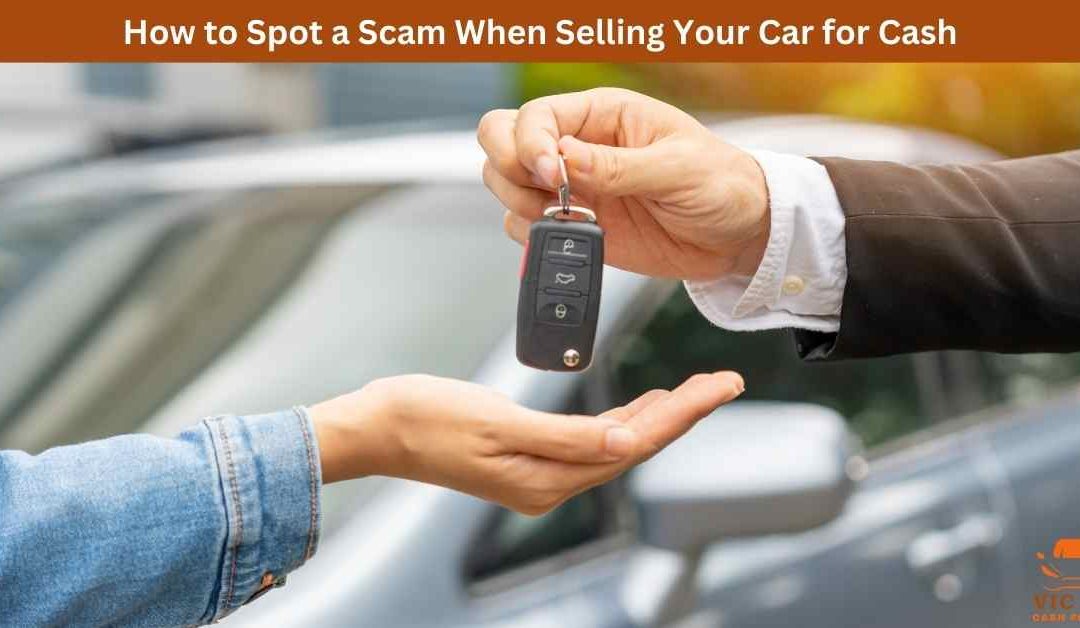Selling your car for cash can be a quick and convenient way to get rid of an old vehicle, but it also comes with potential risks. Unfortunately, scams are all too common in the car-selling market, and unsuspecting sellers can easily fall victim to dishonest buyers. To protect yourself and ensure you get a fair deal, it’s essential to be aware of the warning signs of scams. In this blog, we’ll guide you through how to spot a scam when selling your car for cash and provide tips on how to stay safe during the process.
1. Unrealistically High Offers
One of the most common tactics scammers use is offering an unrealistically high price for your car. While it might be tempting to accept an offer that’s much higher than expected, it’s important to remember that if something seems too good to be true, it probably is.
a. Why It’s a Red Flag
Scammers often use high offers to lure in sellers quickly. Once you’re hooked, they may try to change the terms of the deal, ask for personal information, or even disappear with your car without paying.
b. How to Protect Yourself
Always research the market value of your car before agreeing to any offer. If an offer is significantly above the average price, proceed with caution. Ask the buyer questions about why they’re willing to pay more and be wary of vague or unclear answers.
2. Requests for Personal Information
Scammers may ask for personal information early in the process, claiming they need it to process the payment or complete the sale. This can include requests for your driver’s license number, bank account details, or other sensitive information.
a. Why It’s a Red Flag
Legitimate buyers do not need extensive personal information just to buy a car. Scammers might use this information to steal your identity or access your financial accounts.
b. How to Protect Yourself
Never provide personal or financial information until you have thoroughly vetted the buyer and are confident the transaction is legitimate. Even then, share only the necessary details, such as your name and contact information, after verifying the buyer’s credentials.
3. Insistence on Online or Untraceable Payments
Another common scam involves buyers insisting on using online payment methods or untraceable transactions like wire transfers or prepaid debit cards. They may claim these methods are quicker or more secure, but in reality, they are often difficult to trace and recover.
a. Why It’s a Red Flag
Once you send money via untraceable methods, it’s nearly impossible to get it back if something goes wrong. Scammers rely on this fact to disappear with your funds without completing the transaction.
b. How to Protect Yourself
Stick to secure and traceable payment methods like bank transfers, certified checks, or cash. If you’re dealing with cash, make sure to meet the buyer in a public place and count the money before handing over the keys and paperwork.
4. Pressure to Make a Quick Decision
Scammers often pressure sellers to make a quick decision, claiming they need to close the deal immediately due to an urgent situation. This tactic is designed to prevent you from taking the time to think through the offer or conduct proper research.
a. Why It’s a Red Flag
Legitimate buyers understand that selling a car is a significant decision and will give you the time needed to consider their offer. Scammers, on the other hand, want to rush you into a bad deal before you realize something is wrong.
b. How to Protect Yourself
Never let a buyer pressure you into making a hasty decision. Take your time to evaluate the offer, conduct research, and consult with a trusted friend or professional if necessary. A genuine buyer will respect your need to make an informed decision.
5. Buyer Refuses to Meet in Person
A buyer who refuses to meet in person is another red flag to watch out for. Scammers may claim they’re out of town, too busy, or have another reason for not being able to meet face-to-face. Instead, they’ll push for an online transaction or send someone else to pick up the car.
a. Why It’s a Red Flag
Face-to-face meetings provide an opportunity to verify the buyer’s identity, inspect the payment method, and ensure the transaction is legitimate. A refusal to meet in person often indicates that the buyer is trying to avoid these checks.
b. How to Protect Yourself
Insist on meeting the buyer in person at a safe, public location. If the buyer refuses or makes excuses, it’s best to walk away from the deal. Additionally, bring a friend or family member along to the meeting for added security.
6. Complicated Payment Arrangements
Scammers may suggest complicated payment arrangements, such as overpaying with a check and asking you to refund the difference, or using multiple payment methods. These tactics are designed to confuse you and make it easier for them to pull off their scam.
a. Why It’s a Red Flag
Complicated payment schemes often involve counterfeit checks or fraudulent transactions that may not be immediately obvious. By the time the scam is uncovered, the scammer may have already taken your car and disappeared.
b. How to Protect Yourself
Keep payment arrangements simple and straightforward. Accept only the full payment in a single transaction, and verify the payment method before handing over the car. If the buyer proposes a complex arrangement, it’s a sign to be cautious.
7. No Interest in the Vehicle’s Condition
A legitimate buyer will want to know the details about your car’s condition, such as its mileage, service history, and any issues it may have. If a buyer shows no interest in these details and is eager to close the deal quickly, it could be a scam.
a. Why It’s a Red Flag
Scammers aren’t interested in the actual value or condition of your car—they’re focused on tricking you into a bad deal. A lack of interest in the vehicle’s condition is a strong indication that the buyer is not genuine.
b. How to Protect Yourself
Be wary of buyers who don’t ask questions about the car or seem unconcerned with its condition. A serious buyer will want to know all the details before making an offer.
8. Unprofessional Communication
Pay attention to the buyer’s communication style. Scammers often use unprofessional language, make spelling and grammar mistakes, or avoid giving clear answers to your questions. They may also be overly eager or seem uninterested in the details of the transaction.
a. Why It’s a Red Flag
Unprofessional communication can indicate that the buyer is not who they claim to be. Scammers often use fake names, burner phones, and untraceable email addresses to hide their identity.
b. How to Protect Yourself
Trust your instincts when it comes to communication. If something feels off or if the buyer is vague, evasive, or unprofessional, it’s best to reconsider the deal. Stick to communicating through secure and traceable channels.
Conclusion
Selling your car for cash can be a straightforward process if you take the necessary precautions. By being aware of the common red flags and taking steps to protect yourself, you can avoid scams and ensure a safe and successful transaction. Always trust your instincts, do your research, and don’t hesitate to walk away from a deal that doesn’t feel right. In the end, your safety and security are the most important factors when selling your car.
If you are in Dingley Village, Victoria 3172, and looking for cash for cars Melbourne service, this is the best way to visit us.
VIC Top Cash For Cars
2 Rochford Pl, Narre Warren South VIC 3805
(03) 7035 7828


Recent Comments